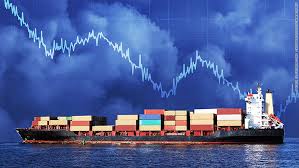How a trade war could turn into a recession

The risk of a global trade war is rising. That could sink the US economy into a recession, bringing an end to the second-longest expansion in American history.
Although the economy is strong right now, businesses and investors are growing more worried about President Trump’s trade crackdown. Tensions are escalating, raising the chances that the trade spat will morph into an outright trade war.
“The probability of a full blown trade war is low but the risks are rising,” Bank of America Merrill Lynch US economist Michelle Meyer wrote to clients on Friday.
Meyer warned that a “major global trade confrontation would likely push the US and the rest of the world to the brink of a recession.”
Here’s how the dominoes could fall: First, businesses would be hit with higher costs triggered by tariffs. Then, companies won’t be able to figure out how to get the materials they need. Eventually, confidence among executives and households would drop. Businesses would respond by drastically scaling back spending.
Trump has already imposed tariffs on Canada, Mexico and the European Union, and those allies swiftly retaliated. The first round of tariffs on China are set to go into effect on July 6, and Trump has threatened more. The administration is also weighing auto import tariffs and restrictions on Chinese investment in US technology.
Fears of a trade war are rattling Wall Street. The Dow fell more than 300 points on Monday, sinking for the ninth day of the last 10.
Related: Trade war fears spread to tech
Of course, there is a huge difference between a trade spat and an outright trade war.
The steps the administration has taken so far directly touch only a small fraction of the US economy. Bank of America estimates that just over $ 100 billion worth of goods have been targeted, or about 4.2% of total goods imports.
“We are still many steps away from a full blown trade war,” Meyer wrote.
However, she said, “trade tensions are likely to get worse before it gets better.”
The problem is that uncertainty over trade policy could freeze investment decisions by major companies and cost others dearly.
Confidence is already waning among business executives in Germany, which relies heavily on exports. The IFO business climate index dipped in June, led by a sharp decline among companies involved in global trade.
In the United States, Harley-Davidson (HOG) warned on Monday that retaliation from the European Union could cost the company as much as $ 100 million a year. The company is shifting some motorcycle production out of the United States.
Atlanta Fed President Raphael Bostic said last week that companies are setting the bar for investing in new projects “quite high.” He said that “optimism” about the corporate tax cut “has almost completely faded among my contacts.”
Meyer said that a wave of tariffs would hurt consumer sentiment and hurt business supply chains by causing “bottlenecks” and disruptions.
“A decline in confidence and supply chain disruptions could amplify the trade shock, leading to an outright recession,” she wrote.
Related: Chinese tech investment is next target in Trump’s crackdown
US economic growth has accelerated recently, and the outlook had been bright thanks in large part to corporate tax cuts and a surge in government spending.
Greg Valliere, chief global strategist at Horizon Investments, wrote in a note to clients that talk of a recession “seems far-fetched.”
Others agree — for now, at least.
“The risk of recession is still very low” because of the “powerful stimulus” from tax cuts and government spending, said David Kelly, chief global strategist at JPMorgan Funds.
But he conceded that the uncertainty caused by tariffs is likely to slow down the economy and offset the benefits of the tax cuts.
Meyer said that “further escalation,” including auto tariffs, would cause Bank of America to “reassess” the outlook for the US economy.
